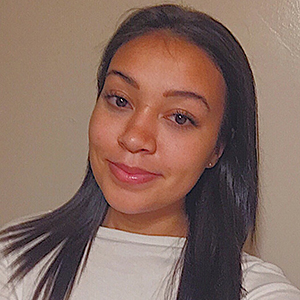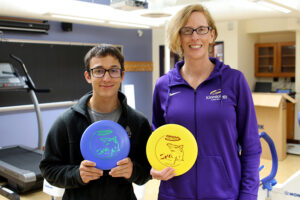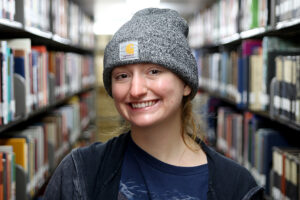FURSCA Overcomes COVID Challenges
Related Posts
Connect With Us
Both on campus and virtually, Albion College students successfully produce research and scholarship.
November 5, 2021
By Ariel Berry
“This year just had a lot of really great things happen, and coupled with last year, it is a story of strength and resilience and doing great things despite the pandemic,” says Dr. Vanessa McCaffrey, professor of chemistry. McCaffrey is the director of Albion College’s Foundation for Undergraduate Research, Scholarship and Creative Activity (FURSCA), a multifaceted offering whose signature component is its summer program.
To participate in FURSCA’s summer program, a student writes a proposal and selects a faculty or staff member to work with on their project. FURSCA is cross-disciplinary, attracting students from both the arts and the sciences.

“The pandemic definitely affected food insecurity,” says Caitlyn-Rae Arendse, ’22, whose FURSCA project seeks to open a community fridge in Albion.
Like everything else, FURSCA was upended by the pandemic the past two years. In spite of that, students and faculty have proven to be resilient in the face of unexpected challenges. McCaffrey remembers “so many challenges related to COVID—in the first summer (in 2020), we went 100 percent online and projects had to be changed basically in a week. No one could work on campus and everything was remote,” she says. “That meant many of the projects that were based in the lab had to pivot to literature or something else that could be done remotely. Isolation was hard, as was finding places to work.
“This summer, most of the students were able to stay on campus to work,” McCaffrey continues, “but we had about six or seven who were remote either the whole time or part-time. Time zones make it difficult to set up meetings. We were flexible with students and worked to make sure that we still engaged them.”
Throughout the summer students held virtual presentations of their work, and McCaffrey and some of the students facilitated online discussions. In pre-pandemic years, these presentations were held weekly in Bobbitt Auditorium. While working virtually provided challenges, there were also benefits to be found.
“I think that remote projects are here to stay,” says McCaffrey. “COVID has shown us that meaningful scholarship can be done, even if it is moderated by Google Meet. Faculty liked the flexibility, and for some students it made more sense.”
One of those students is Caitlyn-Rae Arendse, ’22, an economics and management major with an emphasis in international business and economics. For her FURSCA project, she worked remotely part-time with Dr. Vicki Baker, professor of economics and management, on organizing a community fridge for Albion that will open in Spring 2022. She says COVID precautions, while necessary, made her task more difficult.
“I think the number-one thing that was super challenging was I really wanted to talk to community members, and I wanted to talk specifically to high schoolers and young adults and basically ask them about their own relationship with food in the community,” Arendse says. “But I found that during the pandemic, people were being so cautious and we had to follow so many social-distancing rules.”
The pandemic also delayed the opening of the fridge, due to difficulties meeting with people in order to find a location, which Arendse is currently still arranging with community leaders. Not surprisingly, because of the pandemic, a community fridge is needed now more than ever, she explains.
“I do think that the pandemic definitely affected food insecurity,” she says. “I mean, people can’t even pay their house mortgages, let alone transport their children to school with gas money; it’s hard out there.” When the fridge opens in the spring, it will provide a place for anyone who is hungry to find food and drink freely accessible. Arendse is especially invested in ending food insecurity for Albion’s children, and she hopes the community fridge she has planned will help reach that goal.
Pandemic-Inspired Scholarship

Tyler Hood, ’21, collaborated with Dr. Julie Cousins, associate professor of kinesiology, for his disc golf FURSCA project.
Another aptly planned pandemic project was by kinesiology major Tyler Hood, ’21, who graduates in December. He worked with Dr. Julie Cousins, associate professor of kinesiology, on a disc golf study. The pandemic caused many people to go outside to safely socialize and exercise, and Hood’s project was the perfect fit. Participants in the study were asked to play disc golf three days a week for six weeks, and were evaluated physically and emotionally before and after the completion of the study.
The results, Hood notes, were promising. “We saw that there was a marginal effect on the intervention group for reduced anxiety compared to the control group,” he says. “We also found that for the intervention group, they increased muscle mass size in their throwing arm by a good amount. Also, the torso increased in muscle mass for the intervention group over the control group.”
Though most of the results are statistically insignificant due to the small sample size, they are encouraging and Hood is hoping for more participants in a second study taking place this fall. Hood also designed signs that have been placed on the disc golf course at Victory Park that illustrate each hole and help guide players.
Olivia Grantham, ’22, an English major with a focus in creative writing, worked with Dr. Helena Mesa, professor of English, on her FURSCA project. She says she found inspiration in the pressure from the pandemic. “I really wanted to do something that talked about the pandemic and other pandemics in an artistic way, and something that actually relates to what my major is, and something creative,” Grantham says. “I wanted an outlet to express my emotions about the pandemic.” She chose to research poetry of two pandemics—the AIDS pandemic of the 1980s and the current COVID-19 pandemic.

English major Olivia Grantham, ’22, researched pandemic-influenced poetry, and also wrote her own verses as part of the experience.
She even wrote her own pandemic poetry in response to her research and worked with Mesa to revise and polish her work. Grantham says the poetry from the two pandemics shared some similarities, but she noticed many differences as well. “With AIDS poetry there was a lot more at stake for people, because if you came out with AIDS you were kicked out of school or sent away from your family and stuff like that. And so coming out with having AIDS was much more different from coming out and having COVID,” she says. “COVID was a much more universal experience.”
Grantham adds that the pandemic didn’t negatively impact her research too much. Because she was working remotely and couldn’t access Stockwell Library, Grantham had to order the books she needed for her research, but she was reimbursed by the FURSCA program, making her research financially feasible.
This was not the only financial support that students received this past summer. Students receive a stipend for their summer FURSCA research, and part of the stipend this year included a grocery store gift card upon arrival. Stipend payments typically don’t roll out until four weeks after the program starts, McCaffrey explains, and students in the past had expressed difficulties paying for food during that time. “We were happy that, because of the generosity of donors who support extra things like this, we were able to take ‘food insecurity’ off the list for them,” McCaffrey says.
Despite the challenges the pandemic caused, FURSCA students were still able to thrive. Additional recent successes include national undergraduate research awards for Anna Crysler, ’22 (biochemistry) and Nathaniel Jennings, ’22, and Daniel McGarry, ’22 (physics); an exploration of biology and anthropology by Jess Garcia-Lopez, ’22; and research into Albion’s Black history by Akaiia Ridley, ’22. Though the pandemic has caused difficulty and heartbreak, Albion’s FURSCA students have tackled the challenges with determination and grit, resulting in meaningful scholarship.